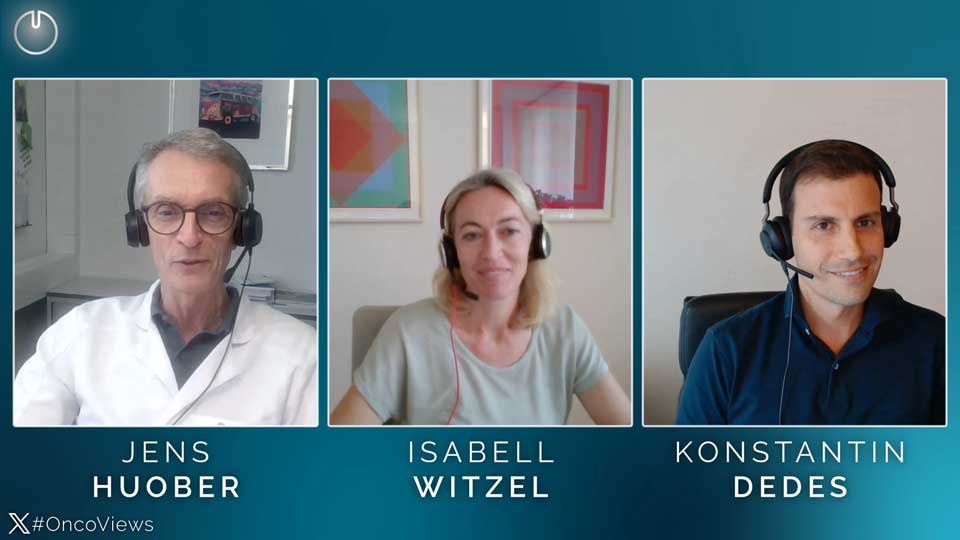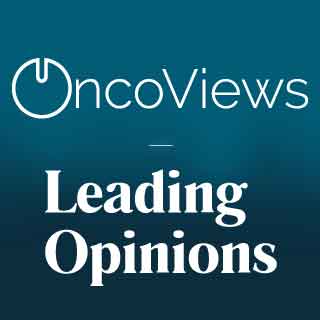A diverse therapeutic landscape is now available for managing HR-positive/HER2-negative advanced breast cancer. A broad spectrum of patients can be covered with targeted approaches in addition to endocrine therapy.
The PALOMA-2, MONALEESA-2, and MONARCH 3 studies have shown significant extensions in progression-free survival (PFS) in the first-line setting of advanced hormone receptor (HR)-positive/HER2-negative breast cancer with the addition of CDK4/6 inhibitors palbociclib, ribociclib, or abemaciclib to endocrine therapy (ET) (1-3). In case of renewed progression, one option is to switch endocrine therapy while continuing CDK4/6 inhibition. This was successfully implemented in the postMONARCH study and the MAINTAIN study (4,5). However, a final assessment of this strategy is still pending.
Players on the PI3K/AKT/mTOR pathway
The PI3K/AKT/mTOR pathway plays a central role in HR-positive breast cancer and is targeted by various therapeutic agents. The SOLAR study, in which patients with progression during or after aromatase inhibitor (AI) therapy received either fulvestrant plus alpelisib or fulvestrant plus placebo, is considered the landmark study for PI3K inhibition (6).
The group with PI3K mutation benefited significantly and clinically relevantly from the combination (median PFS: 11.0 vs. 5.7 months; HR: 0.65). In a very small group of patients with previous CDK4/6 inhibitor therapy (n = 20), there was also a benefit from combination therapy with alpelisib (5.5 vs. 1.8 months; HR: 0.48). The addition of the AKT inhibitor capivasertib to fulvestrant proved beneficial in the CAPItello study (7). Patients had progressed during treatment with aromatase inhibitors (AI) in the adjuvant or metastatic setting. Compared to placebo plus fulvestrant, there was a significant and clinically relevant extension of PFS both in the overall population (7.2 vs. 3.6 months; HR: 0.60) and in the group with AKT pathway alterations (7.3 vs. 3.1 months; HR: 0.50). The CDK4/6 inhibitor-pretreated patients (70%) also benefited from capivasertib plus fulvestrant.
Palbociclib plus Inavolisib
The INAVO120 trial evaluated the combination of the CDK4/6 inhibitor palbociclib and the PI3Kα inhibitor inavolisib in patients with PIK3CA-mutated HR-positive breast cancer and progression during or after adjuvant ET. Placebo plus palbociclib was used as the comparator regimen. Fulvestrant was also administered in both arms. The addition of inavolisib resulted in a significant increase in median PFS from 7.3 to 15.0 months (HR: 0.43) (8). A delay in time to chemotherapy was also demonstrated in the test arm (not reached vs. 15.0 months; HR: 0.54) (9).
Landmark data on the selective estrogen receptor degrader Elacestrant come from the EMERALD study. In this study, patients with HR-positive metastatic breast cancer after prior endocrine therapy and mandatory CDK4/6 inhibitor therapy were randomized to Elacestrant or an endocrine therapy of choice (mostly fulvestrant, 70%). Elacestrant proved particularly effective in the ESR1-mutated population (median PFS: 3.78 vs. 1.87 months; HR: 0.504) (10). The PFS difference was even more pronounced in the subgroup that had previously received a CDK4/6 inhibitor for at least one year (8.61 vs. 1.91 months; HR: 0.410) (11).
ADC: T-DXd and SG
Of high interest are antibody-drug conjugates (ADCs) such as trastuzumab deruxtecan (T-DXd), which was investigated in the DESTINY-Breast04 trial in HER2-low breast cancer (i.e., HER2 1+ or 2+/FISH-) (12). In the HR-positive cohort (90% of patients), T-DXd vs. TPC (investigator’s choice of chemotherapy) led to significant prolongation of PFS (9.6 vs. 4.2 months; HR: 0.37) and overall survival (OS; 23.9 vs. 17.6 months; HR: 0.69).
The DESTINY-Breast06 study also included patients with HER2-ultralow tumors (i.e., staining in <10% of cells). Furthermore, all patients had an HR-positive tumor and were less heavily pretreated (no chemotherapy in metastasis) (13). Compared to TPC, PFS extensions were achieved with T-DXd for both HER2-low cancers (13.2 vs. 8.1 months; HR: 0.62) and HER2-ultralow disease (13.2 vs. 8.3 months; HR: 0.78).
In the TROPiCS-02 study, the Trop2-targeted ADC sacituzumab govitecan extended the median PFS (5.5 vs. 4.0 months; HR: 0.65) and OS (14.5 vs. 11.2 months; HR: 0.79) compared to TPC in heavily pretreated patients (14). Similarly, in the TROPION-Breast01 trial, the Trop2-targeted ADC datopotamab deruxtecan significantly improved PFS in the HR+/HER2 setting after various prior therapies, including CDK4/6 inhibition, compared to investigator’s choice chemotherapy (6.9 vs. 4.5 months; HR: 0.64) (15).
A current algorithm for the treatment of HR+/HER2- breast cancer with recurrence during or after adjuvant ET provides for first-line treatment with ET and CDK4/6 inhibition in the majority of patients (Fig. 1). Subsequently, an individualized approach is considered depending on the genetic set-up, and T-DXd and SG are available in further lines. A BRCA 1 or 2 mutation should always be considered as a further target, as targeted therapies are available here with PARP inhibitors.

© OncoViews
Fig. 1. Treatment algorithm for estrogen receptor-positive/HER2-negative breast cancer with recurrence after or during adjuvant endocrine therapy (preferred therapies are highlighted in bold; the others are further possible options).
To learn more on breast cancer, catch up on our roundtable with Drs. Jens Huober, Isabell Witzel and Konstantin Dedes.
References
- Finn RS et al.: Palbociclib and letrozole in advanced breast cancer. N Engl J Med 2016; 375(20): 1925-36
- Hortobagyi GN et al.: Ribociclib as first-line therapy for HR-positive, advanced breast cancer. N Engl J Med 2016; 375(18): 1738-48
- Goetz MP et al.: MONARCH 3: abemaciclib as initial therapy for advanced breast cancer. J Clin Oncol 2017; 35(32): 3638-46
- Kalinsky K et al.: Abemaciclib plus fulvestrant vs fulvestrant alone for HR+, HER2- advanced breast cancer following progression on a prior CDK4/6 inhibitor plus endocrine therapy: primary outcome of the phase 3 postMONARCH trial. J Clin Oncol 2024; 42(Suppl. 17): Abstr. #LBA1001
- Kalinsky K et al.: Randomized phase II trial of endocrine therapy with or without ribociclib after progression on cyclin-dependent kinase 4/6 inhibition in hormone receptor-positive, human epidermal growth factor receptor 2-negative metastatic breast cancer: MAINTAIN trial. J Clin Oncol 2023; 41(24): 4004-13
- André F et al.: Alpelisib for PIK3CA-mutated, hormone receptor-positive advanced breast cancer. N Engl J Med 2019; 380(20): 1929-40
- Turner N et al.: Capivasertib and fulvestrant for patients with aromatase inhibitor-resistant hormone receptor-positive/human epidermal growth factor receptor 2-negative advanced breast cancer: results from the Phase III CAPItello-291 trial. SABCS 2022; Abstr. #GS3-04
- Jhaveri KL et al.: Inavolisib or placebo in combination with palbociclib and fulvestrant in patients with PIK3CA-mutated, hormone receptor-positive, HER2-negative locally advanced or metastatic breast cancer: phase III INAVO120 primary analysis. SABCS 2023; Poster #PD1-02
- Juric D et al.: First-line inavolisib/placebo + palbociclib + fulvestrant in patients with PIK3CA-mutated, hormone receptor-positive, HER2 negative locally advanced/metastatic breast cancer who relapsed during/within 12 months of adjuvant endocrine therapy completion: INAVO120 phase III randomized trial additional analyses. J Clin Oncol 2024; 42(Suppl. 16): Abstr. #1003
- Bidard F et al.: Elacestrant (oral selective estrogen receptor degrader) versus standard endocrine therapy for estrogen receptor-positive, human epidermal growth factor receptor 2-negative advanced breast cancer: results from the randomized phase III EMERALD trial. J Clin Oncol 2022; 40(28): 3246-56
- Bardia A et al.: EMERALD phase 3 trial of elacestrant versus standard of care endocrine therapy in patients with ER+/HER2- metastatic breast cancer: updated results by duration of prior CDK4/6i in metastatic setting. SABCS 2022; Abstr. #GS3-01
- Modi S et al.: Trastuzumab deruxtecan (T-DXd) versus treatment of physician’s choice in patients with HER2-low unresectable and/or metastatic breast cancer: updated survival results of the randomized, phase III DESTINY-Breast04 study. Ann Oncol 2023; 34(Suppl. 2): S334-90
- Curigliano G et al.: Trastuzumab deruxtecan vs physician’s choice of chemotherapy in patients with hormone receptor-positive, human epidermal growth factor receptor 2-low or HER2-ultralow metastatic breast cancer with prior endocrine therapy: primary results from DESTINY-Breast06. J Clin Oncol 2024; 42(Suppl. 17): Abstr. #LBA1000
- Tolaney SM et al.: Final overall survival (OS) analysis from the phase 3 TROPiCS-02 study of sacituzumab govitecan in patients with hormone receptor–positive/HER2-negative metastatic breast cancer. J Clin Oncol 2023; 41(Suppl. 16): Abstr. #1003
- Bardia A et al.: Datopotamab deruxtecan vs chemotherapy in previously-treated inoperable or metastatic hormone receptor-positive, HER2-negative breast cancer: primary results from the randomised phase III TROPION-Breast01 trial. Ann Oncol 2023; 34(Suppl. 2): S1264-5









